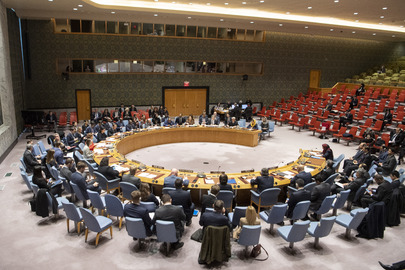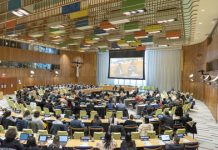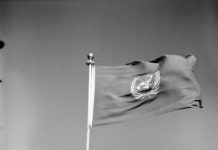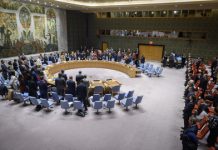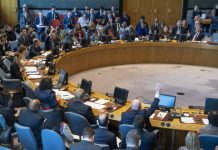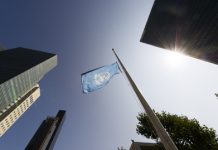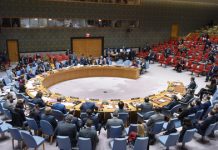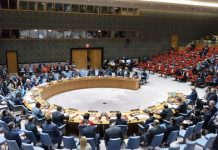“I’m trying not to cry, but I can’t help it. I’m glad I have tissues on hand,” admits Natalia Datchenko, a Ukrainian staff member of the UN children’s agency, UNICEF, struggling to hold back her tears as she recounts the explosions that awoke many Ukrainians three years ago, heralding the start of the conflict.
Natalia Datchenko, employee of UNICEF-Ukraine
Alongside feelings of shock and anger, Ms. Datchenko also felt a surge of energy. “I knew, with absolute clarity, that I wanted to help others, to protect people. I knew I had to do something,” she recalls.
UNICEF leadership instructed staff to prioritise their own safety and that of their families before resuming their work. Ms. Datchenko evacuated to Lviv, a city in the west of Ukraine, with her family.
“There were 12 of us crammed into a small train compartment,” she says. “I held someone else’s child in my arms because there was no place for them to sit. The train moved slowly to avoid being targeted. When we finally arrived, we saw families with children sitting directly on the cold stone floor of the Lviv station. It was February, and it was freezing.”
Life goes on
Lyudmyla Kovalchuk, a staff member of the UN Women office in Ukraine, lived near Kyiv International Airport, one of the war’s first targets.
“We woke up at five in the morning to the sound of explosions,” she explains. “It was shocking. Even though we had heard warnings of an impending invasion, we couldn’t believe it was actually happening.”
Lyudmyla Kovalchuk, UN-Women Ukraine staff member
After three years, exhaustion has set in but life and work continue. Women in Ukraine need the UN’s support – psychological, legal, logistical and financial. Many Ukrainian women are raising children alone, searching for jobs to support them and constantly moving to keep them safe from the war. Ms. Kovalchuk says that about 75,000 Ukrainian women are serving in the military and represent a group with unique needs that require specific support.
“We have adapted to working under new conditions,” Ms. Kovalchuk says. “Whenever we arrange to meet somewhere, we check if there is a shelter nearby in case of an attack. We don’t plan long events as the risk of shelling increases the longer we stay in one place. During the pandemic, we learned to work in a hybrid format, and that experience has been invaluable.”
‘Hardest part was hearing their stories’
Anastasia Kalashnyk, another UN Women staff member, used to live in Zaporizhzhia. Two years ago, she relocated to Kyiv with her family. “After 24 February 2022, my children stopped attending daycare and school, and my husband lost his job – the foreign company he worked for immediately shut down operations and left the country,” she says.
However, Ms. Kalashnyk’s workload increased significantly. Since 2017, she has been responsible for emergency aid provided by UN Women in Ukraine, focusing on women in Luhansk and Donetsk regions. After 2022, many of these women were forced to flee their homes.
In a town in Mykolaivska Oblast, a reconstructed kindergarten shelter now provides 200 children with a safe, fully equipped space for learning during frequent air alerts.
“Looking back, the hardest part was hearing their stories – women I had known for years – about how they escaped occupied territories and what happened to their husbands who had gone to fight,” she says.
For these and other Ukrainian women in need, UN Women, in collaboration with local non-governmental organizations (NGOs), established so-called “safe spaces”. These centres provide essential support, allowing women to connect, share experiences and heal.
“I watched as Olga, one of the women who came to the centre, quite literally come back to life after experiencing trauma,” a UN worker recalls. “She started smiling again. Now, Olga is one of the centre’s activists, helping others.”
The cost of war
According to the UN Office for the Coordination of Humanitarian Affairs (OCHA), more than 12,600 civilians have been confirmed killed and over 29,000 injured over the last three years. At least 2,400 children are among the casualties.
Millions live in constant fear, while those in occupied territories face severe restrictions and limited access to humanitarian aid. An entire generation of Ukrainians is growing up in wartime.
Alina, 12, stands next to her damaged home in Kobzartsi, Mykolaiv region.
Relentless attacks on infrastructure are deepening the crisis. Over 10 per cent of Ukraine’s housing stock has been damaged or destroyed, leaving at least two million families without adequate shelter. More than 3,600 schools and universities have been hit, forcing hundreds of thousands of children into remote learning.
Repeated strikes on the energy system – three winters in a row – have left towns without electricity, heating and essential services in freezing conditions. A total of 12.7 million people require humanitarian aid.
Hopes for the future
“Of course, everything that has happened is exhausting,” Ms. Kalashnyk says. “But my children give me hope for a better future. What they are going through now is unfair. I have to be strong, not just for them but for all Ukrainian families.”
She adds that she also finds hope in the solidarity shown by the UN and other organizations. “They didn’t abandon Ukraine,” she explains. “They stayed. They continue to help. They didn’t come just for a month or two. They’ve been here for years. And now, they’re talking about rebuilding. These discussions about the future give me confidence that we have one.”
Ms. Datchenko from UNICEF also speaks of unity and solidarity. “At first, we were all united by anger,” she recalls. “We shared our burdens. We shared our pain. We were furious together. But anger is no longer the driving force. Now, we are united by the desire to rebuild what has been destroyed. We want to restore our communities, support families and rebuild our country, not as it was, but better, to leave behind the Soviet legacy and create a truly new nation, built on human rights.”
Supplies are distributed by UNFPA at a centre for survivors of gender-based violence in Kherson, Ukraine.
She says her work gives her hope. “I have a unique opportunity to reassess old programmes, create new ones, listen to the voices of the most vulnerable, direct resources where they are truly needed and bridge different sectors to bring together the best for those in need. I believe that working for UNICEF has helped me survive—it’s still my survival strategy.”
‘We have to become stronger’
Ms. Datchenko also finds solace in culture. “I seek inspiration and motivation in the beauty that still exists in Ukraine. Our museums are open, concerts are happening, music is playing. For many, culture is a survival strategy.”
Today, many Ukrainians are searching for their own survival strategies. “One of the biggest challenges we face in our work is the psychological toll, not only in supporting ourselves, but also our colleagues,” Ms. Kovalchuk says. “Recently, one of our colleague’s brothers went missing. Sometimes, it’s incredibly difficult to find the right words of comfort, yet we work with people – women and girls affected by war – who need our support.”
“But, on the other hand, when you face one tragedy after another, one crisis after another, you start to feel stronger and more experienced. What doesn’t kill us makes us stronger.”
Then, with a sad smile, she adds that “maybe it’s true, but I always say I wish I didn’t have the experience I have now. But I have no choice. This experience is mine to bear.”
Source of original article: United Nations (news.un.org). Photo credit: UN. The content of this article does not necessarily reflect the views or opinion of Global Diaspora News (www.globaldiasporanews.net).
To submit your press release: (https://www.globaldiasporanews.com/pr).
To advertise on Global Diaspora News: (www.globaldiasporanews.com/ads).
Sign up to Global Diaspora News newsletter (https://www.globaldiasporanews.com/newsletter/) to start receiving updates and opportunities directly in your email inbox for free.


